- Home
- Elif Shafak
Honor Page 2
Honor Read online
Page 2
One day, out of the blue, the animal started to act strangely, as if possessed by a mischievous djinni. When Pembe tried to pat him on his chest, he lunged at her with a growl and bit her hand. More than the shallow cut he caused, it was the change in the dog’s character that was worrying. Lately there had been an outbreak of rabies in the region and the three village elders insisted that she go to a doctor, except there was none within sixty miles.
So it was that the girl Pembe, with her father, Berzo, took first a minibus, and then a bus, to the big city, Urfa. The thought of spending the day away from her twin, Jamila, sent a chill down her spine, but she was equally delighted to have her father all to herself. Berzo was a solidly built, broad-boned man with strong features and a large moustache, the hands of a peasant, and hair greying at the temples. His deep-set hazel eyes were kindly, and apart from the times when he displayed a temper, he had a calm disposition – even if it saddened him profoundly not to have a son to carry his name to the ends of the earth. Though a man of few words and fewer smiles, he communicated with his children better than his wife did. In return, his eight daughters competed for his love, like chickens pecking at a handful of grain.
Travelling to the city was fun and exciting; waiting at the hospital was neither. Lined up in front of the doctor’s door were twenty-three patients. Pembe knew the exact number because, unlike the other eight-year-old girls in her village, she and Jamila went to school – a decrepit, one-storey building in another village forty minutes’ walk away – and could count. There was a stove in the middle of the classroom that spurted more smoke than heat. Younger children sat to one side of it, older children to the other. As the windows were rarely opened, the air inside was stale and as thick as sawdust.
Before starting school Pembe had taken it for granted that everyone in the world spoke Kurdish. Now she understood that wasn’t the case. Some people didn’t know Kurdish at all. Their teacher, for instance. He was a man with short-cut, thinning hair and a doleful look in his eyes, as if he missed the life he had left behind in Istanbul and resented having been sent to this forsaken place. He got upset when the students didn’t understand what he was saying or made a joke in Kurdish at his expense. He had recently introduced a set of rules: whoever uttered a word in Kurdish would have to stand on one foot by the blackboard with their back turned to their classmates. Most students stayed there for a few minutes and were then pardoned on the condition that they didn’t repeat the mistake; but from time to time someone was forgotten in the course of the day and had to spend hours in the same position. The rule had generated opposite reactions in the twins. While Jamila clammed up completely, refusing to speak any language whatsoever, Pembe tried hard to excel in Turkish, determined to learn the teacher’s language and, through that, to reach his heart.
Meanwhile, their mother, Naze, didn’t see the point in their going to such lengths to master words and numbers that would be of no use, since they would all get married before long. But her husband insisted that his daughters be educated.
‘Every day they walk all that way back and forth. Their shoes are wearing out,’ Naze grumbled. ‘And what for?’
‘So that they can read the constitution,’ said Berzo.
‘What’s a constitution?’ she asked suspiciously.
‘The law, you ignorant woman! The big book! There are things that are allowed, things that are forbidden, and if you don’t know the difference you’re in deep trouble.’
Naze clucked her tongue, still not convinced. ‘How’s that going to help my daughters get married?’
‘What do you know? If one day their husbands treat them badly, they won’t have to put up with it. They can take their children and leave.’
‘Oh, where will they go?’
Berzo hadn’t thought about that. ‘They can seek shelter in their father’s home, of course.’
‘Uh-hm, is that why they trudge so far every day and fill their minds with that stuff? So that they can return to the house where they were born?’
‘Go and bring me tea,’ Berzo snapped. ‘You talk too much.’
‘Perish the thought,’ Naze murmured as she headed to the kitchen. ‘No daughter of mine will abandon her husband. If she does, I’ll beat the hell out of her, even if I’m dead by then. I’ll come back as a ghost!’
That threat, empty and impetuous though it was, would become a prophecy. Even long after she had passed away, Naze would come back to haunt her daughters, some more than others. After all, she was a stubborn woman. She never forgot. And she never forgave – unlike dogs.
Now, as they waited at the hospital, Pembe gaped with her child’s eyes at the men and women lined up in the corridor. Some were smoking, some eating the flat breads they had brought from home, some nursing wounds or wailing in pain. Over everything hung a heavy stench – of sweat, disinfectant and cough syrup.
As she observed the state of each patient, the girl felt a growing admiration for the doctor she had yet to meet. The man who could provide a cure for so many diseases must be an extraordinary person, she decided. A seer. A magus. An ageless wizard with miraculous fingers. By the time it was their turn, she was brimming with curiosity and eagerly followed her father into the doctor’s room.
Inside, everything was white. Not like the suds that formed on the surface of the fountain when they washed their clothes. Not like the snow that piled up outside on a winter’s night or like the whey they mixed with wild garlic to make cheese. It was a white she had never seen before – unyielding and unnatural. A white so cold it made her shiver. The chairs, the walls, the floor tiles, the examination table, even the cups and scalpels were awash with this no-colour. Never had it entered Pembe’s mind that white could be so disconcerting, so distant, so dark.
What surprised her even more was that the doctor was a woman – but different from her mother, her aunts, her neighbours. Just as the room was swathed in an absence of colour, the doctor in front of her eyes had none of the female qualities with which Pembe was familiar. Underneath her long coat she sported a knee-length taupe skirt, stockings of the finest and softest wool, and leather boots. She wore glasses so square they gave her the appearance of a grumpy owl. Not that the child had ever seen a grumpy owl but surely this was what one must look like. How different she was from the women who worked in the fields from dawn to dusk, got wrinkles from squinting in the sun and bore children until they had enough sons. Here was a female who was used to having people, including men, hang on her every word. Even Berzo had taken off his cap and dropped his shoulders in her presence.
The doctor gave the father and daughter no more than a grudging glance. It was as if their mere existence tired – even saddened – her. They were clearly the last people she wanted to treat at the end of this arduous day. She did not talk to them much, letting the nurse ask the important questions. What was the dog like? Was he foaming at the mouth? Did he act strangely when he saw water? Had he bitten anyone else in the village? Was he examined afterwards? The nurse spoke very fast, as if there was a clock ticking somewhere and time was running short. Pembe was glad her mother had not come with them. Naze wouldn’t have been able to follow the conversation, and would have made all the wrong assumptions, prickly with apprehension.
While the doctor wrote out a prescription, the nurse gave the child an injection in the stomach that sent her into a full-throated wail. She was still crying hard when they stepped out into the corridor, where the attention of the strangers worsened her distress. It was at that point that her father, with his head straight, shoulders erect – Berzo again – whispered in her ear that if she would be quiet and behave like the good girl that she was, he would take her to the cinema.
Pembe instantly fell silent, eyes glittering with expectation. The word ‘cinema’ sounded like a wrapped sweet: she didn’t know what was inside, but she was sure it had to be something nice.
*
There
were two theatres in the city. The larger one was used more by visiting politicians than by local performers and musicians. Before and after the elections crowds of men gathered there and fiery speeches were made, promises and propaganda circling the air like buzzing bees.
The second venue was far more modest but just as popular. It showed films of varying quality, thanks to the tastes of its owner, who preferred adventures to political tirades and paid smugglers large commissions to bring him new films, along with tobacco, tea and other contraband. Thus the people of Urfa had seen a number of John Wayne Westerns, The Man from the Alamo and Julius Caesar, as well as The Gold Rush and other films involving the funny little man with the dark moustache.
On this day there was a black-and-white Turkish film, which Pembe watched from the beginning to the end with her mouth slightly agape. The heroine was a poor, pretty girl in love with a boy who was very rich, very spoiled. But he changed. Such was the magic of love. While everyone – starting with the boy’s parents – disparaged the young lovers and connived to separate them, they would meet secretly under a willow tree on the banks of a river. There they would hold hands and sing songs as sad as a sigh.
Pembe loved everything about the cinema – the ornate foyer, the heavy, draped curtains, the thick, welcoming darkness. She couldn’t wait to tell Jamila about this new wonder. On the bus back home, she sang the film’s theme song over and over.
Your name is carved on my destiny,
Your love flows in my veins
If you ever smile at someone else
I’d kill myself or grief would kill me first
As Pembe swayed her hips and fluttered her hands, the other passengers clapped and cheered. When finally she fell silent, more out of weariness than out of any sense of propriety, Berzo laughed, his eyes creasing around the edges.
‘My talented girl,’ he said, with a touch of pride in his voice.
Pembe buried her face in her father’s broad chest, inhaling the lavender oil that perfumed his moustache. She didn’t know it, but this would be one of the happiest moments of her life.
*
When they returned home, they found Jamila in a dreadful state – eyes swollen, face puffed up. All day she had waited by the window, fidgeting with her hair, chewing her bottom lip. Then, suddenly and without reason, she had unleashed a terrible cry. No matter how hard her mother and sisters tried to calm her down, she hadn’t stopped wailing.
‘When Jamila started to weep, what time was it?’ Pembe queried.
Naze gave this some thought. ‘Sometime in the afternoon, I suppose. Why are you asking?’
Pembe offered no answer. She had learned what she wanted to know. She and her twin, though miles apart, had cried out simultaneously at the moment of the injection. People said twins were two bodies with one soul. But they were more than that. They were one body, one soul. Destiny and Enough. When one closed her eyes, the other one went blind. If one hurt, the other bled. And when one of them had nightmares, it was the other’s heart that pounded inside her chest.
That same evening, Pembe showed Jamila the dance steps she had seen in the film. Taking turns to mimic the heroine, they twirled, kissed and hugged like a couple in love, giggling.
‘What’s all this noise?’
It was Naze, her voice stiff with disdain. She had been winnowing rice on a flat tray.
Pembe’s eyes widened with resentment. ‘We were just dancing.’
‘And why would you do that?’ Naze retorted. ‘Unless you two have decided to turn yourselves into harlots.’
Pembe didn’t know what a harlot was but dared not ask. She felt a surge of resentment course through her – why couldn’t her mother enjoy the songs as the passengers on the bus had done? Why were perfect strangers more tolerant than one’s closest kin? She was still contemplating this question when she heard Jamila take a step forward, as if to own up to the guilt, and murmur, ‘We’re sorry, Mama. We won’t do it again.’
Pembe glared at her twin, feeling betrayed.
‘It’s for your own good that I say what I say. If you laugh too much today, you’ll be crying tomorrow. Better to feel bad now than soon after.’
‘I don’t understand why we can’t laugh today and tomorrow and the next day,’ Pembe remarked.
It was Jamila’s turn to scowl now. Her sister’s brazenness had not only taken her by surprise but also put her in an awkward position. She held her breath, fearing what would follow next: the rolling pin. Whenever one of the girls crossed a line, Naze smacked both of them with the thin wooden rod in her kitchen. Never on their faces – a girl’s beauty was her dowry – but on their backs and bottoms. The girls found it strange that the instrument they so bitterly abhorred also made the fluffy pastries that they cherished.
Yet that evening Naze did not punish anyone. She scrunched up her nose, shook her head and looked away – as if she longed to be somewhere else. When she spoke again, her voice was calm. ‘Modesty is a woman’s only shield,’ she said. ‘Bear this in mind: if you lose that, you will be worth no more than a chipped .* This world is cruel. It won’t take pity on you.’
In her mind’s eye Pembe flipped a coin in the air and watched it land on her palm. There were always two sides, and two sides only. Win or lose. Dignity or disgrace, and little consolation for those who got the wrong one.
It was all because women were made of the lightest cambric, Naze continued, whereas men were cut of thick, dark fabric. That is how God had tailored the two: one superior to the other. As to why He had done that, it wasn’t up to human beings to question. What mattered was that the colour black didn’t show stains, unlike the colour white, which revealed even the tiniest speck of dirt. By the same token, women who were sullied would be instantly noticed and separated from the rest, like husks removed from grains. Hence when a virgin gave herself to a man – even if he were the man whom she loved – she had everything to lose, while he had absolutely nothing to lose.
So it was that in the land where Pink Destiny and Enough Beauty were born, ‘honour’ was more than a word. It was also a name. You could call your child ‘Honour’, as long as it was a boy. Men had honour. Old men, middle-aged men, even schoolboys so young that they still smelled of their mothers’ milk. Women did not have honour. Instead, they had shame. And, as everyone knew, Shame would be a rather poor name to bear.
As she listened, Pembe recalled the stark whiteness of the doctor’s office. The discomfort that she had felt then returned – only now the feeling was magnified. She wondered about the other colours – periwinkle-blue, pistachio-green and hazelnut-brown – and the other fabrics – velvet, gabardine and brocade. There was such variety in this world, surely more than could be found on a tray of winnowed rice.
It would be one of the many ironies of Pembe’s life that the things she hated to hear from Naze she would repeat to her daughter, Esma, word for word, years later, in England.
Askander . . . Askander . . .
A Village near the River Euphrates, 1962–7
Pembe was a woman of untenable thoughts and unfounded fears. This part of her personality wasn’t something that had evolved over the years. Instead, she had turned superstitious abruptly, almost overnight: the night Iskender was born.
Pembe was seventeen years old when she became a mother – young, beautiful and apprehensive. There she was in a room bathed in a dusky light, staring at the cradle, as if she was still not convinced that this baby with his pink, fragile fingers, translucent skin and a blotchy purple mark on his button nose had defied all the odds and survived; that he would, from now on, be her child, hers alone. Here was a son – the son that her mother had craved, and prayed to have throughout her entire life.
Naze had had one more full-term pregnancy after Pink Destiny and Enough Beauty. It had to be a boy this time – there was no other possibility. Allah owed her this; He was in her debt, she said, even
though she knew she was speaking utter blasphemy. It was a secret agreement between her and the Creator. After so many girls, He was going to make it up to her. Such was her conviction that she spent months knitting little blankets, socks and vests in a blue deeper than stormy nights, all of them designed for her perfect little boy. She wouldn’t listen to anyone – not even to the midwife who examined her after her waters broke and told her, in a voice as quiet as the breeze, that the baby wasn’t positioned right, and that they had better go to the city. There still was time. If they set off now they could be at the hospital before the contractions started.
‘Nonsense,’ Naze retorted, holding the midwife’s eyes in her fiery stare.
Everything was fine. Everything was in His hands. She was forty-nine years old and this would be her miracle child. She was going to give birth here in her own house, in her own bed, as she had done with each and every baby before, only this time it would be a boy.
It was a breech birth. The baby was too big and it was pointing the wrong way. The hours passed. Nobody counted how many, for it would bring bad luck. Besides, only Allah was the owner of time, the Divine Clockmaker. What was unbearably long for mere mortals was only the blink of an eye for Him. Thus the clock on the wall was covered with black velvet, just like all the mirrors in the house, each of which was a gate to the unknown.
‘She cannot push any more,’ said one of the women present.
‘Then we’ll have to do it for her,’ said the midwife resolutely, but her eyes gave away the fear she was hiding.
The midwife put her hand straight through Naze until she felt the sleek, slippery baby squirm under her fingers. There was a faint heartbeat, like a sputtering candle that had reached its end. Gently but firmly, she tried to turn the baby inside the womb. Once. Twice. She was more relentless the third time, acting with a sense of urgency. The baby moved clockwise, but it was not enough. Its head pressed against the umbilical cord, dangerously stifling the amount of oxygen that went through it.

 Black Milk: On Writing, Motherhood, and the Harem Within
Black Milk: On Writing, Motherhood, and the Harem Within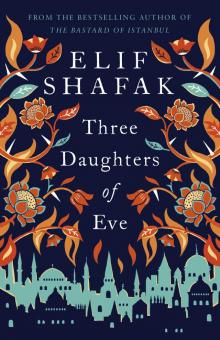 Three Daughters of Eve
Three Daughters of Eve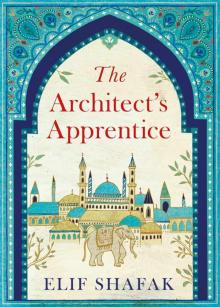 The Architect's Apprentice
The Architect's Apprentice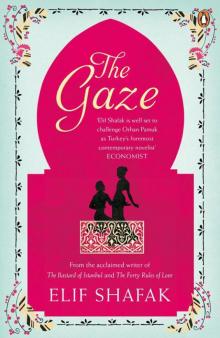 The Gaze
The Gaze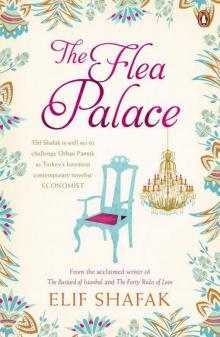 The Flea Palace
The Flea Palace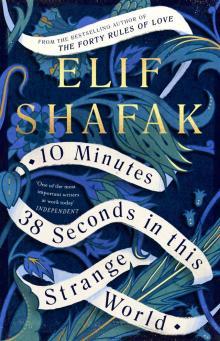 10 Minutes 38 Seconds in this Strange World
10 Minutes 38 Seconds in this Strange World The Forty Rules of Love
The Forty Rules of Love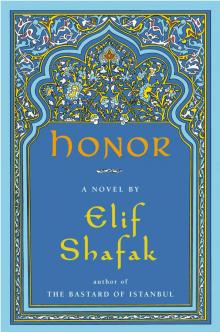 Honor
Honor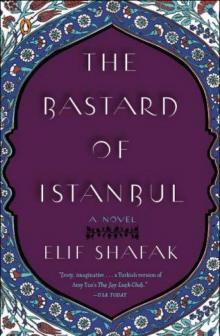 The Bastard of Istanbul
The Bastard of Istanbul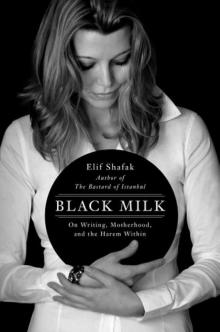 Black Milk
Black Milk The Happiness of Blond People (Penguin Specials)
The Happiness of Blond People (Penguin Specials)